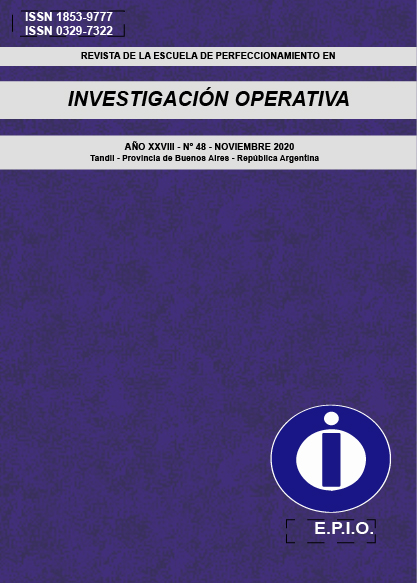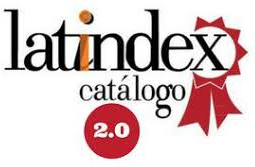Just-In-Time y Eficiencia Energética: implicancias en los sistemas de Gestión de la Energía y procesos de descarbonización de sistemas industriales
Keywords:
energy efficiency, just-in-time, energy management system, energy entrainment method, lean manufacturing, sustainable economic developmentAbstract
This work aims to demonstrate the effectiveness of Just-In-Time management philosophy within an energy management system in an industrial organization and the implications that it could generate in a process of decarbonization of industrial systems in the market economies.
For decades, Just- In-Time has been proving that it is an essential management system to improve the quality of goods and services, increase economic efficiency and improve the profitability profile of a company by consolidating its competitive market position.
In a global context dejected by global warming and the adverse effects of climate change, new questions arise about how to manage resources in organizations, industrial sectors, and the economy in general. From this perspective, it is essential the systematic search for new management systems that collaborate with the limitation of energy consumption and greenhouse gas emissions, promoting the culture of energy saving in global community.
Just-In-Time in the field of Energy Efficiency constitutes a breaking point that will allow us to move towards a system of economic and environmental knowledge based on the concept of continuous energy improvement.
Downloads
References
Abdulaziz, E. A., Saidur, R. y Mekhilef, S. (2011). A Review on Energy Saving Strategies in Industrial Sector. Renewable and Sustainable Energy Reviews, 15 (1), 150 - 168.
Abels, B., Sever, F., Kissock, K. y Ayele, W. (2011). Understanding Industrial Energy Use Through Lean Energy Analysis. SAE International Journal of Materials and Manufacturing, 4 (1), 495 - 504.
Aghelinejad, M. M., Ouazene, Y. y Yalaoui, A. (2018). Production Scheduling Optimization with Machine State and Time-Dependent Energy Cost. International Journal of Production Research, 56 (16), 5558 - 5575.
Aman, S., Simmhan, Y. y Prasanna, V. K. (2013). Energy Management Systems. State of The Art and Emerging Trends. IEEE Communications Magazine, 51 (1), 114 - 119.
Bai, Ch., Kusi-Sarpong, S., Ahmadi, H. B. y Sarkis, J. (2019). Social Sustainable Supplier Evaluation and Selection. A Group Decision-Support Approach. International Journal of Production Research, 57 (22), 7046-7067.
Bañegil, T. M. (1993). El Sistema Just-In-Time y la flexibilidad de la producción. Editorial Pirámide.
Béranger, J. P. (1988). En busca de la excelencia industrial. Just-In-Time y las nuevas reglas de la producción. Editorial Ciencias de la Dirección.
Böttcher, C. y Müller, M. (2016). Insights on The Impact of Energy Management Systems on Carbon and Corporate Performance. An Empirical Analysis with Data from German Automotive Suppliers. Journal of Cleaner Production, 137, 1449 - 1457.
Bunse, K., Vodicka, M., Schönsleben, P., Brülhart, M. y Ernst, F. O. (2011). Integrating energy efficiency performance in production management - gap analysis between industrial needs and scientific literature. Journal of Cleaner Production, 19 (6-7), 667 - 679.
Bushuev, M. A., Brown, J. R. y Rudchenko, T. (2018). Improving delivery for asymmetric Laplace distributed delivery time in a two-stage supply chain. International Journal of Production Research, 56 (15), 5172 - 5187.
Camarda, M. F. (2019). La institucionalidad de la eficiencia energética en la República Argentina. Un análisis de las principales políticas en el período 1980 - 2017. Revista Administración Pública y Sociedad, 7, 22 - 43.
Camarda, M. F. (2017). Eficiencia energética y competitividad industrial. Análisis del sistema de incentivos en torno al Programa Provincial Energía Eficiente (ProPEE). Revista Administración Pública y Sociedad, 3, 62 - 81.
Carretero Peña, A. y García Sánchez, J. M. (2012). Gestión de la eficiencia energética. Cálculo del consumo, indicadores y mejora. Asociación española de normalización y certificación.
Chen, R., Sun, H., Guo, Q., Jin, H., Wu, W. y Zhang, B. (2015). Profit-seeking energy-intensive enterprises participating in power system scheduling. Model and mechanism. Applied Energy, 158, 263 - 274.
Chen, Y-H; Nie, P-Y; Wang, Ch. y Meng, Y. (2019). Effects of corporate social responsibility considering emissions restrictions. Energy Strategy Reviews, 24, 121 - 131.
Chiu, T.Y., Lo, S.L. y Tsai, Y.Y. (2012). Establishing an integration-energy-practice model for improving energy performance indicators in ISO 50001 energy management systems. Energies, 5 (12), 5324 - 5339.
Comisión Económica para América Latina y el Caribe (CEPAL) (2015). La Economía del Cambio Climático en América Latina y el Caribe. Paradojas y Desafíos del Desarrollo Sostenible. CEPAL, Santiago De Chile, febrero 2015, 1 - 95.
Gómez G., Sella Piedrabuena L. y Mathé L. (2013). Eficiencia Energética. En matriz de recursos energéticos de la provincia de Córdoba. Editorial Copiar, 95 - 129.
Gómez Targarona, J. C., Piumetto, M. y Vaschetti, J. (2013). Impacto de la red inteligente y la generación distribuida en los sistemas eléctricos de distribución. En matriz de recursos energéticos de la provincia de Córdoba. Editorial Copiar, 55 – 73.
Groenevelt, H. (1993). The Just-In-Time system. Handbooks in Operations Research and Management Science, 4, 629 - 670.
Grubb, M. (1997). Technologies, energy systems and the timing of CO2 emissions abatement. An overview of economic issues. Energy Policy, 25 (2), 159 - 172.
Hay, E. J. (2003). Justo a Tiempo. La técnica japonesa que genera mayor ventaja competitiva. Grupo Editorial Norma, 2003.
Hayes, R. H. (1981). Why Japanese Factories Work. Harvard Business Review, 59 (4).
Irós, G. M., Moiso, E. A., Bravo, A. O. y Alonso, C. S. (2013). Urbanización, movilidad y demanda energética. En matriz de recursos energéticos de la provincia de Córdoba. Editorial Copiar, 75 - 94.
Jin, T., Shi, T. y Park, T. (2018). The quest for carbon-neutral industrial operations. Renewable power purchase versus distributed generation. International Journal of Production Research, 56 (17), 5723 - 5735.
Jubiz-Díaz, M., Santander-Mercado, A. y Candelo-Becerra, J. E. (2019). A multi-item multi-packaging model to minimize cost of lost units, unpacking cost, and CO2 emissions. International Journal of Production Research, 57 (20), 6246 - 6263.
Kalaitzi, D., Matopoulos, A., Bourlakis, M. y Tate, W. (2019). Supply chains under resource pressure. Strategies for improving resource efficiency and competitive advantage. International Journal of Operations and Production Management, 39 (12), 1323 - 1354.
Khalaf, M., Labib, A. A. y Elsayed, A. E. (2012). An investigation into the relationship between the implementation of lean manufacturing and energy efficiency in industrial organizations. Australian Journal of Basic and Applied Sciences, 5 (12), 1886 - 1896.
Lapillone, B. (2016). Monitoreando la eficiencia energética en América Latina. Comisión Económica para América Latina y el Caribe (CEPAL), Santiago de Chile, septiembre 2016, 1 - 79.
Lee, J. y Kwon, H-B. (2019). The synergistic effect of environmental sustainability and corporate reputation on market value added (MVA) in manufacturing firms. International Journal of Production Research, 57 (22), 7123 - 7141.
Li, F. G. N. (2017). Actors behaving badly. Exploring the modelling of non-optimal behavior in energy transitions. Energy Strategy Review, 15, 57 - 71.
Ohno, T. (1993). El sistema de producción Toyota. Ediciones Gestión 2000.
Organización Latinoamericana de Energía (OLADE) (2013). Simulación de medidas de eficiencia energética en los sectores industrial y transporte de América Latina y el Caribe al año 2030. OLADE, Quito, Ecuador, Mayo 2013, 1 - 43.
Ouyang, J. y Fu, J. (2020). Optimal strategies of improving energy efficiency for an energy-intensive manufacturer considering consumer environmental awareness. International Journal of Production Research, 58 (4), 1017-1033.
Rojas-Rodríguez, D. B. y Prías-Caicedo, O. (2014). Herramientas lean para apoyar la implementación de sistemas de gestión de la energía basados en ISO 50001. Revista Energética, (44), 49 - 60.
Rudberg, M., Waldemarsson, M. y Lidestam, H. (2013). Strategic perspectives on energy management. A case study in the process industry. Applied Energy, 104, 487 - 496.
Shi, Y., Zeng, Y., Engo, J., Han, B., Li, Y. y Muehleisen, R. T. (2020). Leveraging inter-firm influence in the diffusion of energy efficiency technologies. An agent- based model. Applied Energy, 263.
Schonberger, R. J. (1992). Técnicas japonesas de fabricación. Editorial Limusa.
Schonberger, R. J. y Gilbert, J. P. (1983). Just-In-Time purchasing. A challenge for U. S. industry. California Management Review, 26 (1), 54 - 68.
Swords, B., Coyle, E. y Norton, B. (2008). An enterprise energy-information system. Applied Energy, 85 (1), 61 - 69.
Tan, B. (2020). Design of balanced energy savings performance contracts. International Journal of Production Research, 58 (5), 1401 - 1424.
Wang, L., Lu, Z. y Han, X. (2019). Joint optimization of production, maintenance, and quality for batch production system subject to varying operational conditions. International Journal of Production Research, 57 (24), 7552 - 7566.
Wessels, A. (2011). Energy management system implementation at Toyota S.A. Proceedings of the 8th conference on the industrial and commercial use of energy, Cape Town, 2011, 40 - 45.
Yasem de Estofán, I. N. (2004). Sistema Justo a Tiempo. En M. O. Adler, Producción y Operaciones. Ediciones Machi.
Zuo, H. y Ai, D. (2011). Environment, Energy and Sustainable Economic Growth. Procedia Engineering, 21, 513 - 519.
Downloads
Published
How to Cite
Issue
Section
License

This work is licensed under a Creative Commons Attribution-NonCommercial-ShareAlike 4.0 International License.
Atribución — Usted debe dar crédito de manera adecuada, brindar un enlace a la licencia, e indicar si se han realizado cambios. Puede hacerlo en cualquier forma razonable, pero no de forma tal que sugiera que usted o su uso tienen el apoyo de la licenciante.
NoComercial — Usted no puede hacer uso del material con propósitos comerciales.
CompartirIgual — Si remezcla, transforma o crea a partir del material, debe distribuir su contribución bajo la misma licencia del original.







